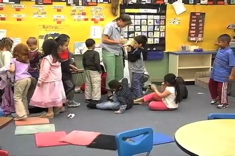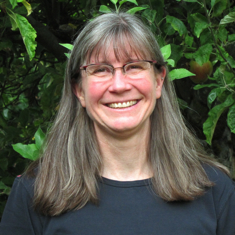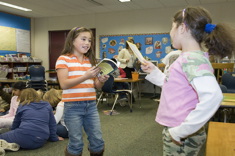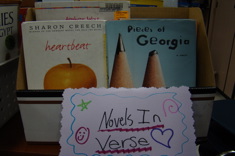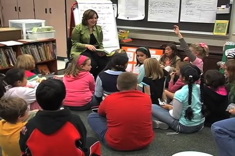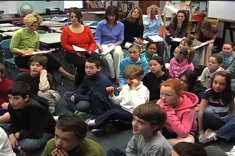I knew I would never forget that feeling that washed over me as I read Staying Fat for Sarah Byrnes. As I sped through the gripping text, I asked myself again and again how the author knew parts of my life story in such emotionally intense ways. I wondered how he was able to write the exact words I kept hidden inside. I had never met the author nor ever told him my story, but in reading his book, I came to realize that I was not the only child who had experienced such a misuse of power. Someone else kept a secret silent and protected the abuser, and this person was a character in a book. Someone else spoke in whispers of the terror of such an experience. I heard someone else use words I had only considered in my head, my journal, or my own rare conversations with other survivors. As I continued to read more of his writing, I came to appreciate Chris Crutcher's artistic ability in articulating details from his ongoing experiences as a youth and children's therapist.
A couple of years ago, I had the pleasure of spending time with Chris at a workshop in Portland, Oregon. While there, he told me about his many school visits across the country, and the youths who regularly ask how he knows their story. While I sat listening to Chris talk that day, I realized again that I was not the only one to seek out these stories to help me make sense of what can never truly make sense. I have seen many students seek out books that seemed out of the ordinary for their lives, but the better I came to know them as learners, the more I appreciated the logic of their book choices. Like many of the readers I know, I have found quiet strength and camaraderie in a variety of reading material, some of it connected with painful experiences in my past. I celebrate how authors like Chris Crutcher willingly write these stories for readers. Bad things happen in life. I know well that the students who enter my classroom, whether they be 35 or 5, often carry pain and suffering inside. Literacy can offer both an entrance to and a road through some of those challenges.
Young Adult Literature with a Sexual Abuse Theme
Sometimes teachers know just the book to support a particular student, and sometimes we are at a loss. More times than not, I hear educators worry about the teens who are silent. Having books in our libraries for them to find during browsing time may offer the opportunity for silence to transition to a request for support.
Of the enormous variety of topics represented in young adult literature these days, I recently read as many young adult books centered on sexual assault as I could get my hands on. Some texts fit my reading style more than others, and this list is by no means exhaustive. However, within each one of these texts was some nugget that made me want to read through the horrors represented to an end. These are stories where victims reconnect with others, or allies stand true in community with those who had been misused.
Speak (1999) by Laurie Halse Anderson, published ten years ago, continues to be celebrated in teen circles across the country. Anderson centers the story on a teen girl who gets raped and then goes silent in trying to figure out how to deal with what she experienced. Through the lens of the victim, Anderson shines light on details many sexual assault survivors deal with by themselves. By the end of the text, the teen moves from victim to survivor as she finds her voice.
Sketches (2007) by Eric Walters is a story framed through homelessness and personal advocacy. A difficult read for me, this story confirmed my worries about how brutal it is to live on the streets, especially for our young teens, and the reasons why this female teen had decided to move out of her parent's house both made sense and provoked tension for me. The struggle for inner peace helps her find her way to a more comfortable life. The story meanders through both negative and positive moments. The characters in Sketches are high-school age, and the storyline includes incest, death, homelessness and loss of parenting support.
Safe (2007) by Susan Shaw captivated me. A young teen is abducted and raped as she walks home from middle school. She fights her way out of and survives the assault only to realize that she has another battle ahead of her: the emotional shipwreck that remains. With a stellar and supportive father and friends who refuse to let her escape into permanent isolation, this story exposes the harrowing experience of living beyond such a traumatic event. The storyline of Safe
details a 13-year-old girl who is abducted from in front of her house, and she is hospitalized from the attack. Advocates and police are accurately included. The abuse is more implied than explicitly stated.
Never So Green (2002) by Tim Johnston was a surprising and rich read for me. Middle school student Tex struggles to accept his own disability, until he discovers his stepfather molesting his stepsister. The stepfather is a successful and supportive baseball coach to both Tex and his stepsister. Tex's mother is kind but in denial. Tex's lawyer father also plays an important role in this realistic read. I most appreciated the subtle role of an important advocate in this book, a relative who is the same age as Tex.
Claiming Georgia Tate (2005) by Gigi Amateau is about Georgia, a 12-year-old who must go live with her sexually abusive father after her mother dies. She battles repeatedly with when, where and how to seek help as the abuse continues. Several advocates from outside of the family come to her aid, advocate for her survival, and help her find family who can truly care for her. I really enjoyed this read for the tenacity of the young survivor, and the variety of supportive adults who came to Georgia's aid just when her situation appeared hopeless.
Identical by Ellen Hopkins (2008) was a challenging read for me. It is one of the more graphic and edgy of the texts I read, framed through the author's succinct, detailed writing and thorough character development. Hopkins aptly ties in many emotional aftereffects of childhood sexual assault into this text: dissociation, dissociative identity disorder, cutting, and suicide attempts. The way Hopkins weaves blame into the storyline is disturbing and deftly accurate. I found myself deeply saddened and a little uneasy in finishing the text. It hammers home the utter loss children (and this case, teens) can experience when living through the horrors of incest.
Bait by Alex Sanchez (2010). I truly appreciated how this book offered me a unique view into what boys experience as survivors of sexual assault. I have read other books from this point of view, but never quite connected to them. Sanchez aptly weaves both inner struggles and anger into a teen's journey in a way anyone can relate to, regardless of gender. The storyline includes a number of supportive males, bullies, and a family structure that fits the bill for many childhood sexual assault survivors. This is a rich read that made me realize how important hearing from our silenced males is.
Glimpse by Carol Lynch Williams (2010) is written entirely in verse. Prostitution, suicide attempts, and child abuse are all in this starkly written text. At first confused by the storyline, I rapidly found myself completely immersed in the world of Hope and her quest to understand what made her older sister Liz attempt suicide. In an effort to support her sister, Hope listens closely to her sister's whispered words and silent actions during the sister's stay in lockdown at a local hospital. Hope grows up quickly in this text, moving from dutiful daughter to truth teller for her silenced sister. I loved this book.
I Hadn't Meant to Tell You This by Jacqueline Woodson (1994). Woodson is a masterful storyteller. Race and socioeconomic tensions rise in the midst of sexual abuse. Marie doesn't believe the victim Lena at first, a common situation that is not often represented between middle-school teens in the books I read. True to form, Woodson presents the changes Marie goes through effectively, and although she realizes she can't save her terrorized pal, she certainly finds ways to help her find safe refuge.
Kevin Brooks' book Dawn (2009) frames surviving childhood sexual assault with a raw, terse voice. This storyline centers on a young teen who faces myriad challenges alone, trying vigilantly to deny being assaulted and her father's disappearance. Alcoholism, drug dealing and abuse fill her parents' world. New friends aren't trustworthy, and Dawn struggles throughout the text with how to deal with her father's rape. I was surprised at the edgy way this book caught and held my attention.
Learning To Swim: A Memoir by Ann Turner (2000) was the only nonfiction book I found written in verse for teens. Ann tells the story of repeated assaults from a neighborhood boy at her family's summer vacation home. With supportive adults nearby, silence turns to support as the tragedy is shared. I appreciated this story for its simple text and story, and the clean metaphor of learning to swim for dealing with the assault that summer.

